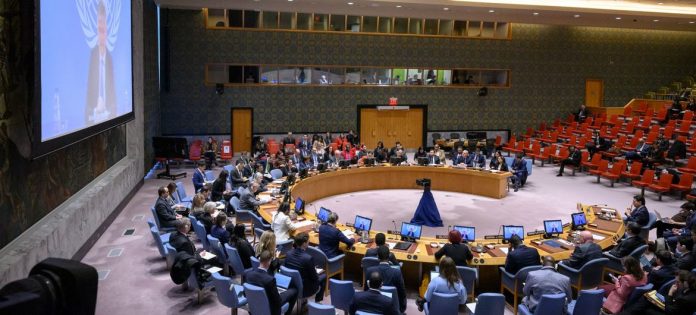Under-Secretary-General for Peace Operations Jean-Pierre Lacroix was accompanied by Major General Patrick Gauchat, Head of the UN Truce Supervision Organization (UNTSO) who is temporarily leading the UN force in the Golan, UNDOF.
Currently in Lebanon, Mr. Lacroix is visiting the UN Interim Force in the country UNIFIL, which monitors the border of separation with Israel known as the Blue Line. Earlier that day, he and the UN Secretary-General visited the Mission’s area of operations.
Recent hostilities
The peacekeeping chief provided updates on UNIFIL’s activities as a delicate truce between Lebanon and Israel remains in effect.
Signed on 27 November 2024, the agreement ended over a year of clashes between Hezbollah militants and the Israel Defense Forces (IDF) sparked by the Gaza war. The agreement calls for Israel to vacate southern Lebanon areas within 60 days and for Lebanese troops to redeploy during this period.
Almost 20 years ago, Hezbollah and Israeli forces clashed, prompting the adoption of Resolution 1701 (2006) by the Council which continues to be relevant today.
Deployments and demolitions
Mr. Lacroix mentioned that as of 15 January, the Lebanese Armed Forces (LAF) have deployed to 93 locations south of the Litani River, a significant increase from the estimated 10 locations on 27 November. UNIFIL has supported many of these movements.
He expressed encouragement after hearing about a detailed plan for an IDF withdrawal and Lebanese redeployment presented at a meeting on 6 January.
However, Mr. Lacroix noted ongoing Israeli demolitions of tunnels, buildings, and agricultural land, as well as reported airstrikes and violations of Lebanese airspace.
UNIFIL continues to detect projectile trajectories fired from south to north of the Blue Line but at lower levels compared to before the truce.
Withdrawal from the region
Stressing that the continued presence of Israel Defense Forces in Lebanon is a violation of Resolution 1701, Mr. Lacroix urged the IDF to withdraw from Lebanese territory promptly, ideally by the end of the specified 60-day period mentioned in the cessation of hostilities announcement.
He highlighted the significant presence of unauthorized armed personnel, assets, and weapons related to Hezbollah and other non-State armed groups south of the Litani in violation of the UN resolution. He commended the increased resolve of the LAF in addressing these violations.
Additionally, UNIFIL has identified 116 caches of weapons and ammunition, potential tunnels, and Hezbollah sites, alerting the LAF for necessary action.
The Secretary-General will further emphasize this message during his meetings with Lebanon’s newly elected leaders in Beirut on Saturday.
© UNIFIL/Haidar Fahs
The UN Interim Force in Lebanon (UNIFIL) is holding its positions in the south, where violence is escalating.
Support for UNIFIL
Mr. Lacroix highlighted UNIFIL’s adjustments in posture and operational activities to assist in the cessation of hostilities, aligned with its mandate under resolution 1701. He expressed hope that the new political dynamics in Lebanon would provide more support to UNIFIL to fulfill its mandate effectively.
He emphasized the critical importance of unrestricted freedom of movement and full access throughout UNIFIL’s area of operations to ensure the complete implementation of the resolution.
Despite seven weeks passing since the truce, most contingents remain confined to base due to nearby IDF military activities, requiring occasional shelter in bunkers. Operational activities are hindered by unexploded ordnance, IDF roadblocks, and local interference.
Mr. Lacroix acknowledged the challenges in Lebanon but highlighted a reason for optimism coupled with a strong determination to prevent a return to previous hostilities.
He stressed that maintaining security and stability along the Blue Line is crucial for communities in southern Lebanon and northern Israel. The return of residents has commenced in southern Lebanon with Israeli withdrawal and reconstruction efforts accelerating. Israel has also outlined a plan for the return of its residents near the Blue Line in March 2025.
He applauded the election of a new President in Lebanon and the appointment of a Prime Minister as significant steps in strengthening State institutions.
Peacekeeping operations amid challenges
Major General Patrick Gauchat highlighted the operational obstacles faced by UNDOF in carrying out its mandate amidst heightened tensions in the separation area.
Efforts are being made to establish stable communication channels with Syrian authorities to support UNDOF’s operations. UNDOF peacekeepers, with UNTSO observers’ support, remain in their pre-December 2024 positions, continuing tasks like monitoring the ceasefire line and patrolling the area.
Heavy construction work and communication setups by the IDF in the separation area have been noted, deemed as a temporary defensive measure.
UNDOF has informed the IDF of the violation of the 1974 Disengagement of Forces Agreement due to their presence and activities in the area.
Mr. Gauchat highlighted that the IDF’s presence and roadblocks have severely impacted UNDOF’s operations, reducing essential logistics missions significantly. Nonetheless, the mission adapted its approach, increasing patrols and addressing urgent safety concerns.
Local concerns and liaison efforts
Local residents in the Golan have voiced concerns to UNDOF, calling for the IDF to leave their villages and reporting instances of searches and arrests of their relatives.
UNDOF is actively engaging in liaison efforts to understand and address these grievances, emphasizing the importance of uninterrupted execution of their mandated tasks.
Mr. Gauchat urged all parties to maintain the ceasefire and adhere to the terms of the 1974 Agreement, counting on the continued support of Member States for full mandate implementation.




